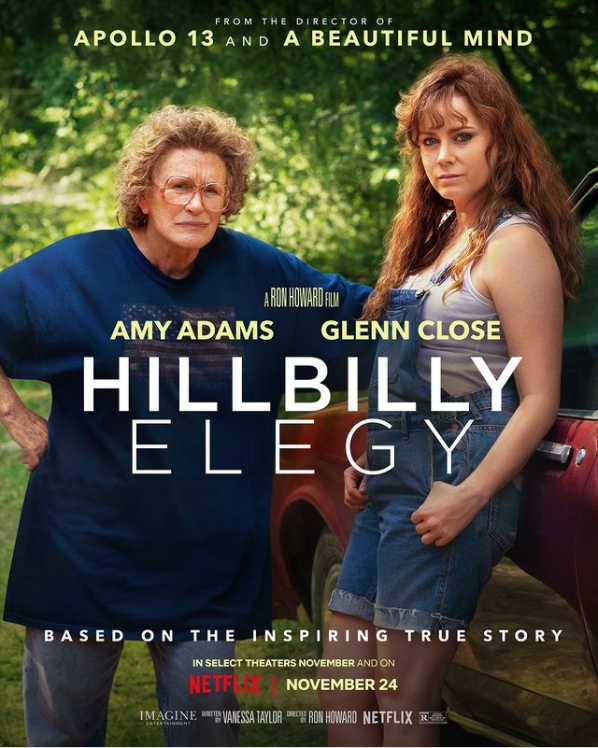‘Hillbilly Elegy’ Proves to be Disastrous Misfire
@netflix
Ron Howard’s new film ‘Hillbilly Elegy’ debuted on Nov. 24 to incredibly mixed reactions. Photo courtesy of @netflix.
November 27, 2020
Right off the bat, the words “Directed by Ron Howard” raised a pretty big red flag during the opening credits of Hillbilly Elegy. The renowned child actor-turned-director had been struggling for the past couple of years to regain his footing after the disappointing and unsuccessful Solo: A Star Wars Story, and Hillbilly Elegy seemed to be his best shot at doing that. Based on a best-selling memoir of the same name and featuring an all-star cast, all the pieces were in place for Howard to clear his name and re-establish himself as a respectable director once more. Maybe he could even nab some Oscars from it, too. Upon release, however, all hopes of this were quickly dashed as the absolutely abysmal reviews came pouring in. But what exactly makes Hillbilly Elegy so bad despite all of the key ingredients of success being present?
The film is based on J.D. Vance’s controversial 2016 novel, which debuted in the midst of the 2016 presidential election. The book not only served as an opportunity for Vance to speak of his troubled past, but to also cast light on an often forgotten and overlooked community in the United States in an attempt to portray them in a more sympathetic and respectful manner. The movie, however, succeeds at doing the exact opposite, painting the citizens of Midwestern America as downright awful. There is not one character in the entire movie that comes off as likable by the time it has wrapped its nearly two hour run, and that is a major problem. There’s virtually zero character development as well, meaning each of the three main characters end up just as awful and unlikable as they were at the beginning. Since the movie attempts to make an effort to show what this community is supposed to really be like, it all comes off as downright offensive and degrading.
The film’s main theme, which is that family is the most important thing of all, falls completely flat, as each character is given no opportunity to actually prove this message true because while they may repeat it over and over again, they never actually act on it. Family instead, is seen as a burden rather than an asset, as it is made apparent very early on that each characters’ lives would drastically improve without the others, blatantly contradicting the overused and unoriginal theme Hillbilly Elegy tries so hard to stress.
“Shameless Oscar Bait” is another phrase that comes to mind when attempting to describe this movie, as it’s incredibly clear that the casting of Amy Adams and Glenn Close was only done in an attempt to take home some awards. As good at acting as they both are, they are nowhere near their best here, particularly Adams, who just proves that she’s good at screaming and crying without providing any real substance. Close, however, is one of the film’s only positive aspects, as she delivers a fairly solid performance and is one of the only somewhat likable characters when she isn’t being overtly racist or setting people on fire. Yes, you read that correctly. It’s bizarre that either actress even agreed to take a part in this total misfire, but seeing as how neither of them have won an Oscar for their performances in a movie, it’s not too hard to deduce why they would’ve in the first place. This is easily one of the biggest mistakes of both of their careers.
In the end, Hillbilly Elegy serves as just another lazy attempt at substance and emotion, but never before in recent memory has something essentially guaranteed for success taken such a wrong turn for the worse. It’d be a real shame if both Adams and Close received Razzies for this before they finally won their well-deserved Oscars for something else.




Misti Melendez • Nov 30, 2020 at 4:19 pm
I am so relieved to see the comments that posted about this movie.
I completely disagree with the writer’s opinion of this movie. I think it brings generational poverty, physical, mental, emotional and substance abuse to the forefront of the minds of those watching the movie.
It depicts the struggles that many American families face daily. It also is realistic in the way the story unfolds and allows the observer to learn about each character. As the story unfolds even further, as the observer you realize that you have judged that character before you truly understand what has caused or led to the issues each struggle with throughout the movie.
And, finally at the end of the story you understand that we all do the best we can with what we have to work with. I think it more than adequately gives the viewer a understanding of the sacrifice each family member for each other because of and despite of the dysfunction this family struggles with for generations. At the end of the movie it shows that all the generational dysfunction can still effect the family, but it can also lead to a positive change.
Oliver Barnfield • Nov 30, 2020 at 11:09 am
Loving these comments lol
Christopher Welles • Nov 29, 2020 at 10:30 pm
I think pan reviews like this stupid review are written by people with no real life experience at all.
Mr. Swanson has absolutely no clue what he’s writing about.
The fact the his ignorance will deter others from seeing this important and valuable movie is disheartening.
He should return to video games and keep his uneducated opinions to himself.
He has no credibility at all.
I think Amy Adams and Glenn Close gave Oscar worthy performances.
There is no family this movie wouldn’t touch.
Eileen Costello • Nov 29, 2020 at 9:46 pm
Don’t know where this spoiled, entitled writer is from but he certainly has no understanding of the conditions in poor communities of the US and he certainly has no understanding of the lack of help for mental health issues, drug issues, poor education and the struggles poverty brings. I thought the performances were all wonderful and the movie, although heartbreaking, is a true slice of American life many people don’t want to be aware of.
Hayden Swanson – as the saying goes – Don’t judge until you walk in someone else’s shoes.
bill abraham • Nov 29, 2020 at 9:01 pm
I am so glad that I saw the movie before reading the review…the review might have prevented me from watching what was a movie a really enjoyed…it was a very real story in many ways… too bad the reviewer was looking to do a review more than watching a story come to life (even though it was based on a true story).
Michele OMalley • Nov 29, 2020 at 8:27 pm
I strongly disagree with this critics review. I thought this movie was real, raw and the family believable disfunctional. Ron Howard did not sugar coat anything. Glen Close and Amy Adams deserve Oscars for their portrayal of these disfunctional people. The makeup was exceptional as well. I would recommend this movie to any adult.
L. CHALKER • Nov 29, 2020 at 6:53 pm
I LIKED THIS MOVIE, VERY TOUCHING.
GLENN CLOSE WAS VERY GOOD, POSSIBLY AN OSCAR NOMINATION FOR THIS ROLE I THINK. AMY ADAMS GAVE A VERY GOOD PERFORMANCE ALSO .
RON HOWARD CONGRATULATIONS FOR THIS MOVIE.
Donna Perrone • Nov 29, 2020 at 7:37 am
I disagree. I think this is a wonderful movie depicting a family that had tumultuous tragedies over and over. This true story is not unique, this storyline happens over and over again anywhere in America. It doesn’t have to be drugs or alcohol. It could be many other manipulative reasons that people of dependent personalities have on there children.
I loved the last scene when he left his mother to forge his own life knowing she’d never change, something like that happens everyday. And this could be anywhere. I didn’t notice that everyone in the film was so awful. Where did you grow up? There are mean people in this world.
Ron Howard, you did a wonderful job in portraying what really happens in America. And I hope they all win an Oscar
Laszlp • Nov 29, 2020 at 6:29 am
From my life experience, growing up on the Ohio border with Pennsylvania, it was portrayed accurately.
Rural America is not a Norman Rockwell painting. The problems of drug abuse and alcohol abuse are very real and largely driven by people’s life situations.
I liked the movie. It may have however, exposed the real America, post industrial shut down and close up. Not a pretty picture.
Annette Bacchi • Nov 28, 2020 at 7:19 pm
I have to totally disagree with you. I don’t know what you were watching but Vance went on to become a lawyer, Glen Close become a positive force in her grandson’s life and his mom got clean and I thought it was a riveting story with great acting
Virgil Hernandez • Nov 28, 2020 at 7:16 pm
This movie has connected with me in a deep and powerful way. It is absolutely a great story and remarkable movie.
PERRY Root • Nov 28, 2020 at 6:02 pm
Well everyone has the right to there opinions, but in this case this guy is dead wrong! My wife and I very much felt the movie was well done in all respects.
Alicia Tousignant Warren • Nov 28, 2020 at 5:38 pm
I absolutely disagree with your assessment on this movie! I feel you did not understand the heart of the movie or or feel it because you may be to young? I cried on so many occasions throughout this movie.
The main characters were well built, heartwarming, the narrator was a little dull, that could have been mentioned in your editorial on the movie. It is always hard to build out a movie from a book, characters get lost from book to movies. I feel Glenn Close was spectacular, the midwestern people aren’t awe full, they are raw and real. The abuse and love happens in real life and real families, yet they move forward and live good lives. Great movie.
Janel Oulaw • Nov 28, 2020 at 5:05 pm
I think this movie was incredible!! Glenn Close and Amy Adams did their job, acting!! I could relate and understand this movie in so many ways and I believe no matter how u were raised, many others can feel the strength, weakness, failures, and determination of the many characters in this movie!! Great job Ron Howard and ALL actors in this REAL WORLD MOVIE!!!!
John Langstaff • Nov 28, 2020 at 5:01 pm
Mr Swanson comes off as a superfluous hack writer, whose whining appeal for a love story and an endearing character, totally misses the point of the flawed characters and post-industrial stagnation that make this a tragic comment on the depressed state of a community without a soul.
Ron Burnett • Nov 28, 2020 at 8:40 am
You are just one opinion.
I thought it was a good movie with great acting.
It’s not up to Ron Howard to shine a good light on the Appalachian’s.